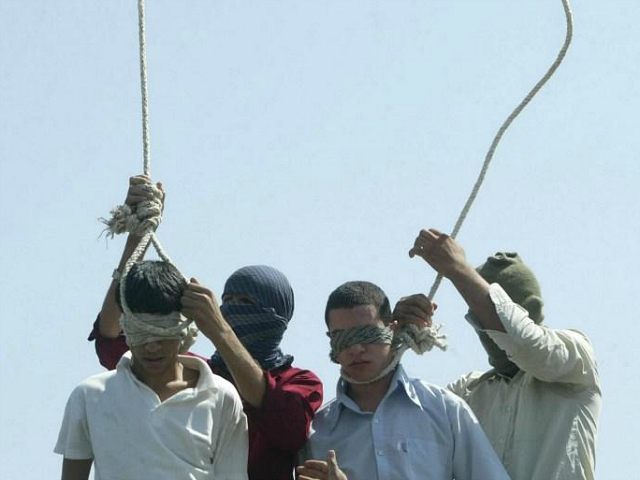Amnesty International’s latest report on Iran states the regime executed 694 people between January 1 and July 15. This means the country averages at least three executions a day.
“Iran’s staggering execution toll for the first half of this year paints a sinister picture of the machinery of the state carrying out premeditated, judicially-sanctioned killings on a mass scale,” explained Said Boumedouha, Deputy Director of Amnesty International’s Middle East and North Africa Programme. “If Iran’s authorities maintain this horrifying execution rate we are likely to see more than 1,000 state-sanctioned deaths by the year’s end.”
The organization rallies against the death penalty, but they keep a very close eye on Iran’s executions. Amnesty claims the death sentences “are invariably imposed by courts that are completely lacking in independence and impartiality.” These suspects do not receive fair trials or access to proper defense attorneys. They are also shocked that some offenses are criminal within the regime, “let alone attract the death penalty.”
Courts found the majority of the executed guilty of drug offenses. A new law allows the death penalty for numerous drug charges, “including trafficking more than 5kg of narcotics derived from opium or more than 30g of heroin, morphine, cocaine or their chemical derivatives.” Amnesty found no evidence that a death penalty sentence lowers drug use or trafficking. In fact, despite the harsh new law, “methamphetamine production and abuse of hard drugs are skyrocketing.” Officials say at least 2.2 million Iranians are addicted to drugs. Only 1.3 million are in a rehabilitation program.
Iran hanged eleven prisoners a day before Amnesty released their report. Ten prisoners lost their lives at the Gohardasht Prison of Karaj, while another died at the Esfaham prison. The regime executed 65 people in one week during April.
From the National Council of Resistance in Iran (NCRI):
In the past week (from April 12 to 18), henchmen hanged at least 65 prisoners. Forty-five of these have been executed just in Karaj City prisons. On April 13, eight prisoners were hanged in Karaj’s Central Prison while 13 other prisoners were executed in Ghezel Hessar Prison. On the next day, 19 prisoners were hanged in Gohardasht Prison. And on April 15, henchmen hanged five prisoners in Gohardasht. Among those executed was Javad Saberi, a juvenile at the time of his arrest.
During this period, one prisoner was hanged on April 12 in Mehriz (Yazd Province), eight prisoners were hanged on April 12 and 15 in Arak, three were hanged on April 14 and 15 in Shiraz, four prisoners were hanged on April 13 in Esfahan, and four were hanged in Zahedan on April 18. Two of those executions, in Mehriz and in Shiraz, were public hangings.
The holy month of Ramadan did not stop Iran from executing or severely punishing people. At least ten people lost their lives during the month. NCRI reported the regime flogged 900 people for not fasting during Ramadan. That number includes young children and women. Another 3,000 received warnings.
The regime added more torture practices on political prisoners, because fasting keeps them extremely weak. “Prisoners are constantly experiencing symptoms of dryness of mucus, muscle pains, severe headaches, blurry vision, vomiting and numbness,” they state.
Officials cut off water to Varamin’s Qarchak Prison for women if they do not observe Ramadan. Police tortured and raped numerous women in this prison during the 2009 uprising. Prison officials told guards “to flog women who eat or drink during fasting hours.” But the regime also performed more executions during the holy month. On June 18, NCRI said the government readied 22 prisoners for death and issued ten more death verdicts.

COMMENTS
Please let us know if you're having issues with commenting.